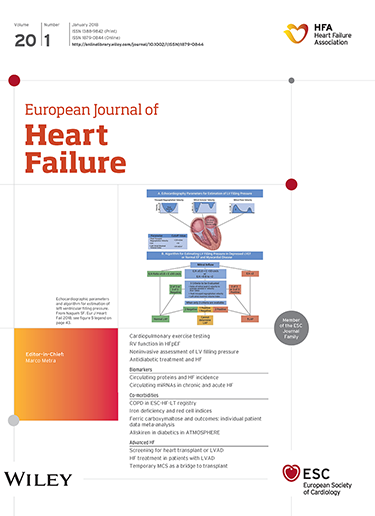Heart failure improvement, remission, and recovery: A European Journal of Heart Failure expert consensus document
IF 10.8
1区 医学
Q1 CARDIAC & CARDIOVASCULAR SYSTEMS
引用次数: 0
Abstract
Heart failure (HF) is a heterogeneous and dynamic syndrome characterized by progressive pathophysiological alterations, variable clinical trajectories, and differential responses to therapeutic interventions. The concept of HF with improved ejection fraction (HFimpEF) underscores this complexity, identifying patients who exhibit an increase in left ventricular ejection fraction (LVEF) following time and/or pharmacological and device‐based therapies. However, the distinction between improvement, remission, and recovery remains inconsistently defined and is primarily LVEF‐centric, lacking comprehensive assessment of structural, functional, and symptomatic HF status. This expert consensus document delineates HF trajectories, examines factors reflecting HF improvement beyond recovery of LVEF, and explores the prognostic implications of these phenotypic transitions. Emphasis is placed on the necessity of continued guideline‐directed medical and device therapy to minimize the risk of relapse. While a subset of patients attains sustained myocardial and clinical recovery, others remain susceptible to relapse, necessitating individualized monitoring and long‐term management. Persistent knowledge gaps regarding the safety and feasibility of treatment de‐escalation, the role of genetic predisposition, and optimal therapeutic strategies underscore the need for further research to refine risk stratification and evidence‐based decision‐making in HFimpEF.心力衰竭的改善、缓解和恢复:一份欧洲心力衰竭专家共识文件
心力衰竭(HF)是一种异质性和动态综合征,其特点是进行性病理生理改变,临床轨迹可变,对治疗干预的反应不同。心衰伴射血分数改善(HFimpEF)的概念强调了这一复杂性,即识别经过时间和/或药物和器械治疗后左室射血分数(LVEF)增加的患者。然而,改善、缓解和恢复之间的区别仍然不一致,主要以LVEF为中心,缺乏对结构、功能和症状性HF状态的全面评估。这份专家共识文件描述了HF的发展轨迹,检查了反映LVEF恢复后HF改善的因素,并探讨了这些表型转变对预后的影响。重点放在持续指南指导的医疗和器械治疗的必要性上,以尽量减少复发的风险。虽然一部分患者获得了持续的心肌和临床恢复,但其他患者仍然容易复发,需要个体化监测和长期治疗。关于治疗降级的安全性和可行性、遗传易感性的作用和最佳治疗策略的持续知识差距强调了需要进一步研究以完善HFimpEF的风险分层和基于证据的决策。
本文章由计算机程序翻译,如有差异,请以英文原文为准。
求助全文
约1分钟内获得全文
求助全文
来源期刊

European Journal of Heart Failure
医学-心血管系统
CiteScore
27.30
自引率
11.50%
发文量
365
审稿时长
1 months
期刊介绍:
European Journal of Heart Failure is an international journal dedicated to advancing knowledge in the field of heart failure management. The journal publishes reviews and editorials aimed at improving understanding, prevention, investigation, and treatment of heart failure. It covers various disciplines such as molecular and cellular biology, pathology, physiology, electrophysiology, pharmacology, clinical sciences, social sciences, and population sciences. The journal welcomes submissions of manuscripts on basic, clinical, and population sciences, as well as original contributions on nursing, care of the elderly, primary care, health economics, and other related specialist fields. It is published monthly and has a readership that includes cardiologists, emergency room physicians, intensivists, internists, general physicians, cardiac nurses, diabetologists, epidemiologists, basic scientists focusing on cardiovascular research, and those working in rehabilitation. The journal is abstracted and indexed in various databases such as Academic Search, Embase, MEDLINE/PubMed, and Science Citation Index.
 求助内容:
求助内容: 应助结果提醒方式:
应助结果提醒方式:


